Last April, U.S. Congressman Richard E. Neal had an extraordinary moment when he was able to pay tribute to his personal as well as political forebears – not in his native Massachusetts, but in Northern Ireland. “It is with no small amount of humility that I accept this honorary degree of Doctor of Laws from Ulster University, and I accept in honor of my grandmother, Mary Ward, who was born in County Down,” said Neal, whose remarks came after an emotional introduction by Ulster University president Paddy Nixon, before a crowd including U.S. House Speaker Nancy Pelosi. The award was bestowed for Neal’s decades of dedication to the cause of a just and lasting peace in Northern Ireland, which most recently included his support for a series of initiatives honoring Thomas P. “Tip” O’Neill – another Massachusetts Democrat with a passion for Ireland, not to mention one of Neal’s political heroes. Neal – who is chair of Congress’s powerful Ways & Means committee – spoke to the crowd about a forthcoming lecture series named after O’Neill, as well Derry-born Nobel Peace Prize-winner John Hume.“The Ulster University Hume O’Neill Washington Lecture Series launched today will connect with local and global peace and conflict experts to further develop expertise in conflict resolution.”
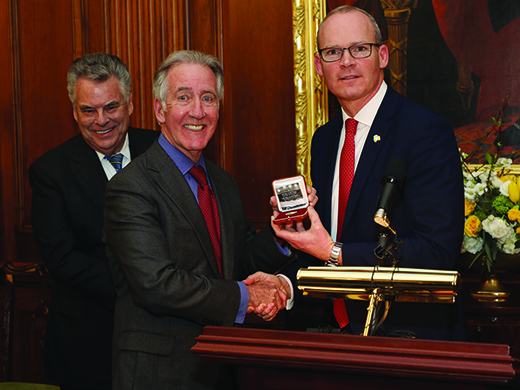
Many Irish Roles
It was just the latest big role for Neal in the Irish peace process on both sides of the Atlantic – and it came a long way from the working-class neighborhoods of Springfield, where Neal grew up amidst the ward politics typified by O’Neill, and, of course, the Kennedy family. “I saw Jack Kennedy the day before the election in 1960,” Neal told Irish America last year. “He finished in three communities: Waterbury, Connecticut; Springfield, Massachusetts; and Boston, and if you’ve ever seen the film footage of him finishing in Springfield and Boston, as you might expect, he got a hero’s welcome. But seeing him that day (my mother was smart enough to keep us home from school) on the steps of Springfield City Hall, I remember that sense of inspiration and aspiration that I felt, the hope and ambition to do something.” Neal was just 10 when his mother, Mary Garvey Neal (with roots in Ventry, County Kerry), took him to see JFK speak. The sense of triumph marked by the Kennedy victory was short-lived – Neal’s mother died of a heart attack just two years later. His father, a school custodian, died soon after. “I was lucky to have an aunt and a grandmother,” Neal recalled. “They were both great. And I also think it’s interesting that they were very Catholic. So we were never adopted. No social worker ever came to check on us. And the grandmother, she was one of fourteen, so I think her attitude was, ‘What’s another mouth at the table?’ My aunt was devout. Remember those days they used to cover their heads when they went to Mass? We said the rosary at night. There is much controversy right now as it relates to some of what happened in the Church, but for my aunt, grandmother, and my mother, the Church to them in those days was everything. It was an anchor.”
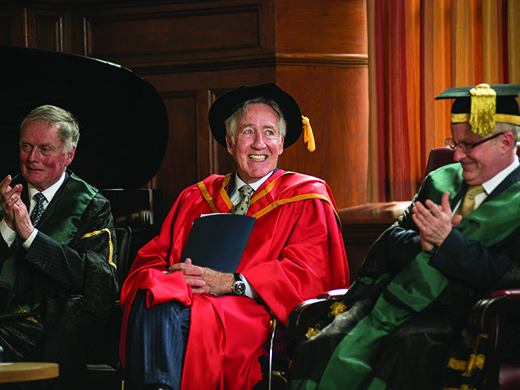
Deep Roots
The Irish roots in Neal’s family – and hometown – are deep. Aside from his paternal grandmother from Down, there are his maternal grandparents from Ventry, West Kerry. “Irish was the first language for the West Kerry people,” said Neal. “Springfield was the next parish over. You went where the others went before you, and they came here. In Holyoke, which is close by, they all came from Mayo. We were all from Kerry. And I think that they were very, very, proud of it. And it wasn’t as though they were going to Irish
rallies or anything like that. But they knew of their traditions; they knew who they were and that they came from a pretty ancient culture that was comprised of great achievers. If you asked those people whereabouts they were from, they never said Ireland; they said they were from Kerry.”
Neal also grew up at a time and in a place when the Irish and the Democratic Party were inseparable.“My family would have known Congressman Eddie Boland. My mother in particular always knew someone who was running for the register of deeds or the city council, because that was the way up. And it was a great time of ascendancy in politics. There was a succession of mayors, six or seven in a row, whose parents or grandparents were Irish-born. The Democratic Party in particular was the beneficiary [of the Irish]; they brought the right infusion of energy. And there was a great alliance between unions and the Democratic Party.”
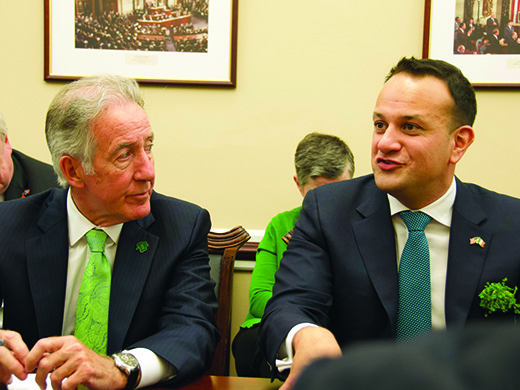
Going to Northern Ireland
Neal was a hard-working and ambitious player in Springfield politics, serving on the city council before his election as the city’s mayor in the early 1980s. At the height of the Troubles, Neal believed Irish Americans could play a powerful role in easing tensions in the North.“The first time I got involved was in 1981 when Bobby Sands died [on hunger strike]. That’s when I took up a position because people in my community were pretty outraged. You know, those guys were dying on hunger strike, and Margaret Thatcher’s response was that they were criminals.” Neal continued: “The first time I went to Ireland was around 1983; I went to visit relatives in County Down. In those days it was a militarized state. There were 30,000 British soldiers in an area the size of the state of Connecticut. You couldn’t go from street to street without being monitored. Helicopters circled no matter where you went. I was on a bus with Speaker of the House Tom Foley, and they boarded the bus. They had the big armaments and they had night vision – it was dark when we got on the bus – and they searched it.”
That involvement continued when Neal was elected to Congress in 1988.
“My first or second speech on the House floor after I got elected was on the use of rubber bullets [in Northern Ireland]. “To Neal, Ireland was in some ways an extension of his heavily Irish district.“I was thirty-eight when I first got elected to Congress. I think I worked at least as hard, if not harder than everybody else. I had a good constituency that I inherited from Eddie Boland. He retired in 1988 and I took his seat… I came through a system where personal loyalty was a very important consideration. You had Joe Moakley [South Boston politician who was chairman of the U.S. House Committee on Rules], Tip O’Neill was just leaving, Eddie Boland had just left, and I took his seat.”To this day, Neal leads the House Friends of Ireland committee, which played an essential role in the lead-up to the 1998 Good Friday peace agreement.

“I’m proud of the American role in the Good
Friday Agreement. This is our agreement, too. We’re the backstop. The British Embassy used to come up to the hill to meet with those of us in the [Congressional] Friends of Ireland. These were not pleasant meetings. But when the Good Friday Agreement came about, Tony Blair applauded us right here at the British Embassy. I remembered his quote all these years later. He said, ‘We’ve been great friends, America and the United Kingdom. We generally agreed on just about everything, but there was one issue we disagreed on: Ireland.’ He said, ‘There was a time when I thought that the Friends of Ireland were a hindrance, but you helped us get through this.’ People forget that the Friends of Ireland was born of the purpose to try to compete with the money that was being used for gun-running. House Speaker Tip O’Neill, who founded it in 1981, said that the idea was just to kind of offer a competing vision. So now you can go and say that the Friends of Ireland position is ‘No Border.’ You can have the Speaker of the House say, ‘I agree!’ I think people have forgotten that.”
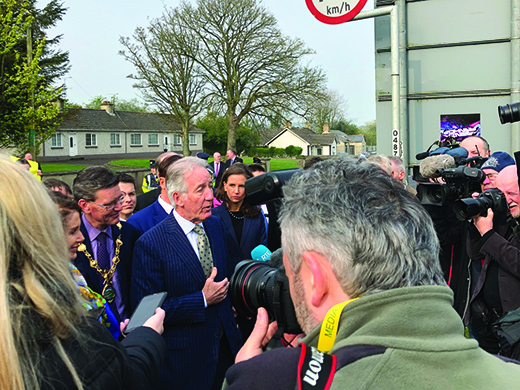
in Northern Ireland in April 2019.
Brexit Troubles?
It’s been a whirlwind start to 2020 for Neal. There was the House impeachment of President Trump, and then the Democratic race for president kicked into high gear. All the while, Neal maintained his duties as Ways & Means chair.Then, overseas, came word that British leaders had finally agreed on a Brexit deal, which could have long-term ramifications for the U.S. and Northern Ireland. In a statement back in January, Neal said he hoped Brexit details would include “incorporating strong provisions on worker rights,” as well as “environmental protection.” He also prioritized “respecting the achievement of the Good Friday Agreement, which has maintained peace and prosperity for communities in the United Kingdom, Europe, and the United States since 1998.”This only makes sense. After all, Neal played a central role in bringing about that “peace and

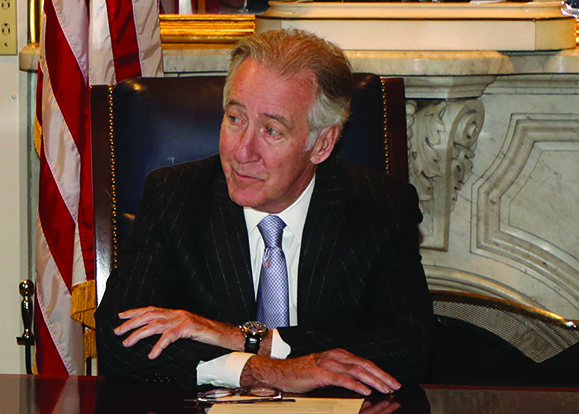
Leave a Reply